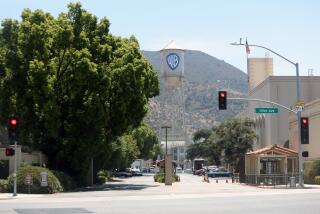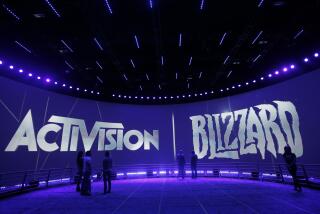Apple’s New Alliance Shakes Up Old Ones
- Share via
SAN FRANCISCO — Shares of Apple Computer Inc. continued to climb Thursday in the wake of the company’s surprising alliance with Microsoft Corp., a move that left others in the industry struggling to find their place in a suddenly altered landscape.
Sun Microsystems Inc. and Netscape Communications Corp., in particular, were forced into damage-control mode because of a widespread perception that they had been blindsided by the deal.
Dave Rothschild, a marketing director at Netscape, scoffed at the news, saying it is “more of a near-term tactical thing to generate press than something that will affect end users.”
But analysts weren’t so dismissive, pointing out that Apple had long been aligned with Sun and Netscape as part of an anti-Microsoft coalition.
“It’s not a stake through the heart for either Sun or Netscape,” said Ron Rappaport, an analyst at Zona Research Inc. in Redwood City, Calif. “But they have lost an ally in their quest to dethrone Microsoft.”
The struggling Apple switched allegiances Wednesday in a deal that includes a $150-million investment by Microsoft in the Cupertino, Calif., company, plus agreements to support each other’s products and share technology.
Apple’s stock has surged more than 47% since the alliance was unveiled by co-founder Steve Jobs at the Macworld Expo in Boston on Wednesday. The company’s stock rose $2.88 to close at $29.19 on Thursday in Nasdaq trading. Microsoft gained 50 cents to close at $143.94, also on Nasdaq.
Analysts said the stock surge was remarkable given that Apple has lost about $1.5 billion in the last 18 months, still lacks a chief executive and has not outlined a clear plan for recovery. Indeed, a host of crucial strategic issues--including whether and how to continue licensing Apple technology and whether to build stripped-down PCs known as network computers--remains unresolved.
Still, the Apple-Microsoft pact was clearly a blow to Netscape, whose Internet browser, Navigator, will be displaced by Microsoft’s Internet Explorer as the preferred means of surfing the Net on Apple computers.
The deal means Internet Explorer will now occupy prime digital real estate on virtually every computer sold in the United States. Microsoft already bundled Explorer with its dominant Windows operating system, which is pre-installed on the vast majority of new computers.
Rothschild downplayed the impact, saying Netscape has maintained 70% market share despite Microsoft’s bundling practices.
“Less than 10% of the people get their browser from a hardware bundle anyway,” he said. “A lot get theirs through Internet service providers and in stores.”
In those areas, Netscape remains strong. The company has deals with major Internet service providers, including Netcom and all the regional telephone companies.
The impact on Sun is more difficult to measure. Sun has been locked in a battle with Microsoft to influence the development of Java, a nascent computer language developed by the smaller company that enables programmers to write one piece of software that can run on any operating system--an especially appealing feature in the Internet environment.
That is seen as a threat to Microsoft, which derives much of its might from the fact that most software and hardware today is designed specifically for Windows.
Some fear that with Apple at its side, Microsoft might be in a better position to influence standards in such a way that Java programs would run best when written for Windows. That could wound Sun and others that sell systems that compete with Microsoft and hope for a day when Windows is no longer dominant.
Jon Kannegaard, vice president at Sun’s JavaSoft division, said the deal between Microsoft and Apple is not a threat.
“Apple is still committed to the Java standard backed by us,” he said. “Microsoft wants this whole thing to slow down until they figure out a way to get in front of it. But you can’t stop these things. The industry wants it.”
Meanwhile, now that Jobs is back in the fold at Apple after a long exile, the company is expected to make another return to its roots by rehiring TBWA Chiat/Day to manage its advertising account.
The ad agency created the legendary “1984” Super Bowl spot that launched the Macintosh computer. In the commercial, an athletic woman hurled a hammer at a video screen that displayed a Big Brother image--a symbol of IBM Corp. The Macintosh was introduced two days later, and inventory sold out in six hours.
TBWA Chiat/Day lost the account to BBDO West in Los Angeles in 1986 on the heels of its disastrous “Lemmings” commercial--another shot at IBM. It showed conformist executives blindly marching off a cliff. BBDO resigned in June when Apple demanded a competition among agencies.
Times staff writer Denise Gellene contributed to this report.






